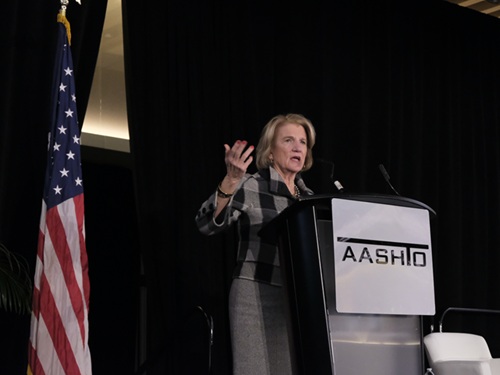The leaders of the Senate Committee on Environment and Public Works recently shared their thoughts on key transportation issues ahead for the 119th Congress during the American Association of State Highway and Transportation Officials 2025 Washington Briefing at the Westin DC Downtown Hotel in Washington, D.C.
[Above photo by AASHTO]
Sen. Shelley Moore Capito (R-WV), chair of the EPW committee, and Sen. Sheldon Whitehouse (D-RI), ranking member of the EPW committee, both highlighted their good working relationship and mutual desire to maintain a “bipartisan focus” as work begins on the next federal surface transportation reauthorization funding package.
Work on that legislation needs to be completed ahead of September 2026, when the current reauthorization package – incorporated within the Infrastructure Investment and Jobs Act or IIJA of 2021 – expires.
“We have decided to carry on with the bipartisan nature of EPW – that is hard to do in this environment, but we have found consensus before [and] I plan to continue that dialog with Sheldon,” explained Sen. Capito in her remarks.
“I am very proud of the work we did [on the IIJA]. We received buy-in from different stakeholders and communities, forged a compromise, and ensured it represented the [transportation infrastructure] needs of all parts of the country,” she added. “We will try to do that again in 2026.”
Sen. Whitehouse also referenced that bipartisanship as well during his remarks.
“EPW has consistently been extremely productive and extremely bipartisan – whether on water or highway infrastructure bills,” he said. “We have a long history working together and I plan to continue that. Shelley and I get along well personally. I like her as chair – that is a good start. I hope that tradition continues.”
Sen. Capito noted that one of her major priorities for the next reauthorization bill is to find ways to improve highway worker safety.
“We have to do better,” she said. “We have to make sure our workforce is safe and that motorists and truckers are very cognizant of their workplace on the road.”
Sen. Whitehouse stressed that the impact of climate change on everything from housing to transportation infrastructure should be a key focal point for the next reauthorization bill.
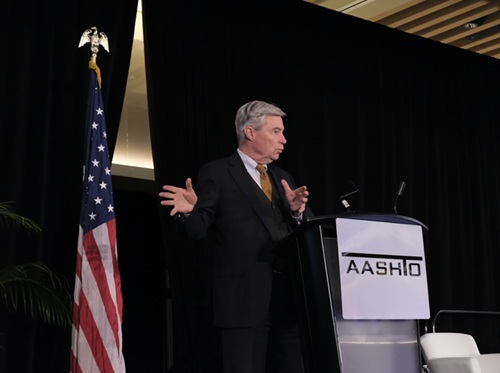
“We see it in the impact of hurricanes and stronger storms on coastal infrastructure and the need to fortify against the wildfires out west,” he said. “We have a fiduciary obligation to look forward to the future – and it is not a good picture; it is in fact particularly ugly in areas most vulnerable to storms and where there is a lack of insurance.”
Sen. Whitehouse also expressed particular concern that coastal storms and wildfires could trigger a property crash that could then cascade into a broader economic collapse.
“We do not want to go through 2008 again,” he said. “The period of consequences we are entering into, signaled by what we are seeing in Florida and California, is something we really need to pay attention to. We need to do a lot more to protect our families and our children.”
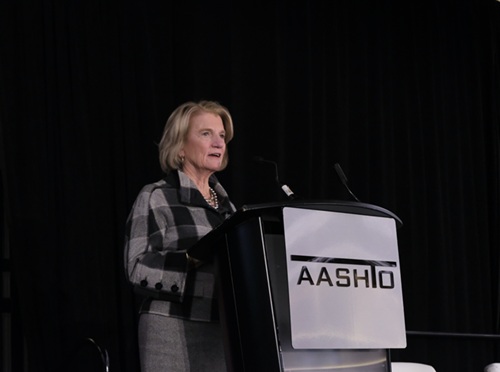
Meanwhile, in terms of direct transportation policy, Sen. Capito does not believe many of the discretionary grant programs included in the IIJA will be included in the next reauthorization bill.
“Some of the discretionary grants program funding sat like mud in a drain – it just sat there,” she explained.
“We want to make sure [that funding] goes to work. Discretionary dollars should go back into formula [program] so you, the states, make decisions that work best for you,” Sen. Capito added. “We need flexibility – for what works in West Virginia does not work in California or Arizona. Providing flexibility in the [formula] program is exceedingly critical to do.”
She also noted that the federal regulatory process is holding up “innovation and modernization and safety” improvements for the transportation system – and that there remains “total bipartisan interest in reform, though there are hurdles we need to get over.”
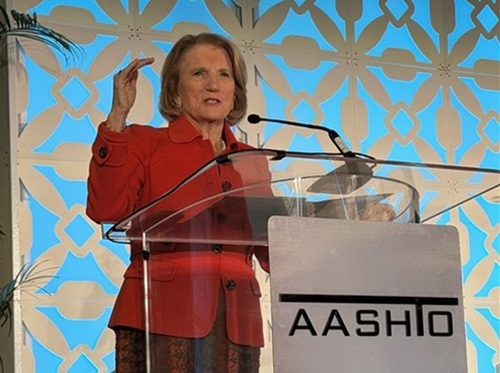 Top Stories
Top Stories
Congressional Leaders Detail Key Transportation Priorities
February 26, 2026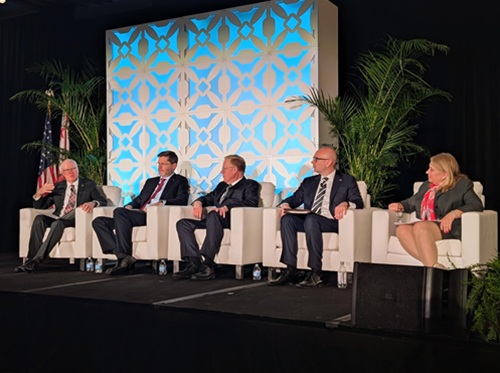 Top Stories
Top Stories
